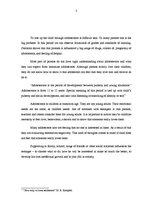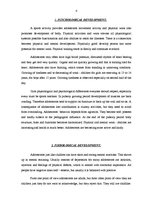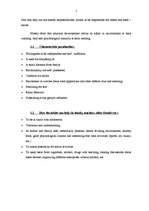-
Adolescents Self-actualization Problems Characteristic
| Nr. | Sadaļas nosaukums | Lpp. |
| 1. | PSYCHOLOGICAL DEVELOPMENT | 4 |
| 2. | PSIHOLOGICAL DEVELOPMENT | 4 |
| 2.1. | CHARACTERISTIC PECULIARITIES | 5 |
| 2.2. | HOW THE ADULTS CAN HELP (IN FAMILY, TEACHERS, OLDER FRIENDS ETC.) | 5 |
| 3. | IDENTITY DEVELOPMENT | 6 |
To rise up the child through adolescence is difficult task. To many parents this is the big problem. Is this period we can observe downward of grades and standards of learning. Statistics shows that this process is influenced y big usage of drugs, crimes of, pregnancy of adolescents, and feeling of despair.
Most part of parents do not have right understanding about adolescence and what they can expect from immature adolescents. Although parents mostly love their children, they do not know how to show it that adolescent can feel that they love him and receive as he is.
"Adolescence is the period of development between puberty and young adulthood." Adolescence is from 11 to 15 years. Special meaning of this period is tied up with child’s puberty and social development, and also with fastening or searching of identity or self.1
Adolescence is children in transition age. They are not young adults. Their emotional needs are the same, as children needs. Are of mistakes with teenagers is that parents, teachers and others consider them for young adults. It is important to notice they’re childlike necessity to feel love, benevolent, concern and to know that someone really loves them.
Many adolescents now are feeling that no one is interested in them. As a result of this they are evaluating themselves negatively. This kind of thoughts comes to mind if child does not feel that someone really loves them.
Supporting in family, school, range of friends or other social societies influences the teenager – to choose what to do, how he will be interested in make so much the better, to develop his own ineffectual growth and to join (fit) in society.…






